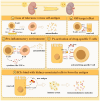The differentiation and intervention strategies for acute kidney injury after or induced by immune checkpoint inhibitors
- PMID: 40371140
- PMCID: PMC12070096
- DOI: 10.62347/JECH8448
The differentiation and intervention strategies for acute kidney injury after or induced by immune checkpoint inhibitors
Abstract
With the increasing popularity of immune checkpoint inhibitors (ICIs) in tumor treatment, the incidence of immune-related adverse events (irAEs), including acute kidney injury (AKI), is on the rise. Renal biopsy serves as the gold standard for determining the true etiology of AKI following ICIs administration; however, due to potential risks and associated losses with this procedure, comprehensive analysis of physiological data and predictive models are gradually being incorporated into clinical practice to differentiate AKI etiologies. These include criteria such as a ≥ 100% increase in serum creatinine (Scr) from baseline or a 50% increase accompanied by other pathological manifestations, renal replacement therapy (RRT), or absence of any other reasonable cause. Currently, cessation of ICIs and steroid therapy represent commonly employed treatment approaches; nevertheless, these strategies have inherent side effects and may not be feasible for certain patient populations, such as those with diabetes, posing challenges for clinicians. Recent studies have demonstrated that rituximab, mycophenolate mofetil (MMF), and infliximab can potentially replace steroid therapy in managing ICIs-induced AKI (ICIs-AKI), offering a novel therapeutic perspective. This review provides an overview of non-invasive methods for distinguishing between AKI following ICIs use and ICIs-AKI while discussing strategies for treating ICIs-AKI.
Keywords: Immune checkpoint inhibitors; acute kidney injury; differentiation; treatment.
AJCR Copyright © 2025.
Conflict of interest statement
None.
Figures



Similar articles
-
The Use of Immune Checkpoint Inhibitors in Oncology and the Occurrence of AKI: Where Do We Stand?Front Immunol. 2020 Oct 8;11:574271. doi: 10.3389/fimmu.2020.574271. eCollection 2020. Front Immunol. 2020. PMID: 33162990 Free PMC article. Review.
-
Incidence and risk factors of acute kidney injury in cancer patients treated with immune checkpoint inhibitors: a systematic review and meta-analysis.Front Immunol. 2023 May 29;14:1173952. doi: 10.3389/fimmu.2023.1173952. eCollection 2023. Front Immunol. 2023. PMID: 37313406 Free PMC article.
-
Diagnosis and Management of Immune Checkpoint Inhibitor-Associated Renal Toxicity: Illustrative Case and Review.Oncologist. 2019 Jun;24(6):735-742. doi: 10.1634/theoncologist.2018-0764. Epub 2019 Mar 22. Oncologist. 2019. PMID: 30902916 Free PMC article. Review.
-
AGA Clinical Practice Update on the Evaluation and Management of Acute Kidney Injury in Patients With Cirrhosis: Expert Review.Clin Gastroenterol Hepatol. 2022 Dec;20(12):2707-2716. doi: 10.1016/j.cgh.2022.08.033. Epub 2022 Sep 6. Clin Gastroenterol Hepatol. 2022. PMID: 36075500 Review.
-
Acute kidney injury in cancer patients receiving anti-vascular endothelial growth factor monoclonal antibody vs. immune checkpoint inhibitors: a retrospective real-world study.BMC Cancer. 2024 Jun 24;24(1):756. doi: 10.1186/s12885-024-12540-y. BMC Cancer. 2024. PMID: 38914959 Free PMC article.
References
-
- Longhitano E, Muscolino P, Lo Re C, Ferrara SA, Cernaro V, Gembillo G, Tessitore D, Speranza D, Figura F, Santarpia M, Silvestris N, Santoro D, Franchina T. Immune checkpoint inhibitors and the kidney: a focus on diagnosis and management for personalised medicine. Cancers (Basel) 2023;15:1891. - PMC - PubMed
-
- Seethapathy H, Zhao S, Chute DF, Zubiri L, Oppong Y, Strohbehn I, Cortazar FB, Leaf DE, Mooradian MJ, Villani AC, Sullivan RJ, Reynolds K, Sise ME. The incidence, causes, and risk factors of acute kidney injury in patients receiving immune checkpoint inhibitors. Clin J Am Soc Nephrol. 2019;14:1692–1700. - PMC - PubMed
-
- Baker ML, Yamamoto Y, Perazella MA, Dizman N, Shirali AC, Hafez N, Weinstein J, Simonov M, Testani JM, Kluger HM, Cantley LG, Parikh CR, Wilson FP, Moledina DG. Mortality after acute kidney injury and acute interstitial nephritis in patients prescribed immune checkpoint inhibitor therapy. J Immunother Cancer. 2022;10:e004421. - PMC - PubMed
Publication types
LinkOut - more resources
Full Text Sources
